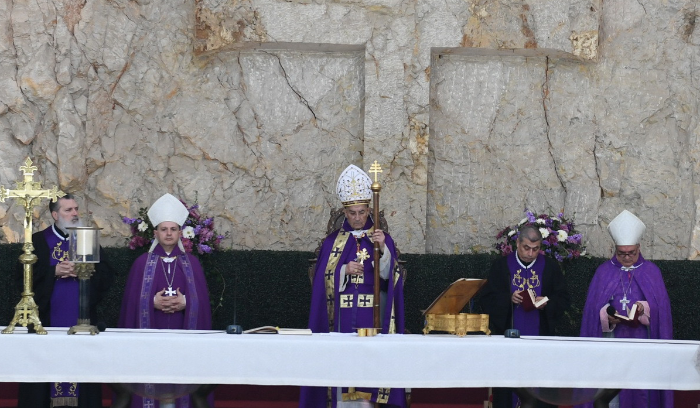
Maronite Patriarch Bechara al-Rai (center) during his Sunday homily. (Credit: NNA)
BEIRUT — Maronite Patriarch Bechara al-Rai said in his Sunday homily that “political blindness” continues to cause Lebanon's escalating economic, financial and social crises, reminding his congregation that the country was ranked 136th, or second last, in the 2023 “World Happiness” report published by the Sustainable Development Solutions Network.
“This political blindness … caused parliamentary blocs and the ones in power behind them to prevent the election of a president of the republic, so that the constitutional institutions would not be organized,” Rai said.
Since Michel Aoun's presidential term ended on Oct. 31, the country has been faced with a dual executive power vacuum for the first time in its history, with Najib Mikati's cabinet serving only in a caretaker capacity since it assumed the status following May's legislative elections.
Eleven parliamentary sessions have been held to date to elect a successor to Aoun, but all have ended in failure as no political consensus has been reached on a single candidate. Such consensus is customary in Lebanon prior to a candidate winning election in Parliament.
“The Parliament has lost the power to legislate, question and account, and the government lacks the authority to hold its sessions to take procedural decisions in accordance with the constitution,” Rai said.
Lebanon's caretaker Prime Minister Najib Mikati on Saturday canceled a cabinet meeting scheduled for Monday due to "some people's attempts to drag the country into a sectarian division to fuel conflicts," according to a statement issued by the caretaker premier.
Cabinet was scheduled to meet Monday to discuss the economic crisis’ impact on “different sectors, including public sector employees and retirees.” Employees of state telecom operator Ogero are the latest group of state employees to go on an open-ended strike to demand a salary adjustment in the face of Lebanon's ongoing economic crisis.
The Greek Orthodox Metropolitan of Beirut, Elias Audi, on Sunday expressed his “regret over what happened … regarding daylight savings time, which turned into a sectarian discrepancy in matters that have nothing to do with religion and sects.”
“Does Lebanon need to isolate itself more and move away from the world, even in time? … Isn't it better for officials to care about how to get out of the disaster that they inflicted on the country instead of creating a commotion about changing the clock?” Audi asked.
The decision to postpone daylight savings time in Lebanon took many by surprise and was adopted almost unilaterally following a discussion between caretaker Prime Minister Najib Mikati and Parliament Speaker Nabih Berri.
The Grand Serail announced Thursday that the change to daylight savings time, scheduled for midnight March 25/26, has been postponed until the end of April.
The decision to postpone daylight savings time in Lebanon for a month is "illegal", caretaker Justice Minister Henri Khoury said in a statement Saturday evening.
Some view Mikati's decision as confessional, saying that it was made in view of the impact it would have on the country's Muslim population during the month of Ramadan when many members of the faith fast from sunrise to sunset.